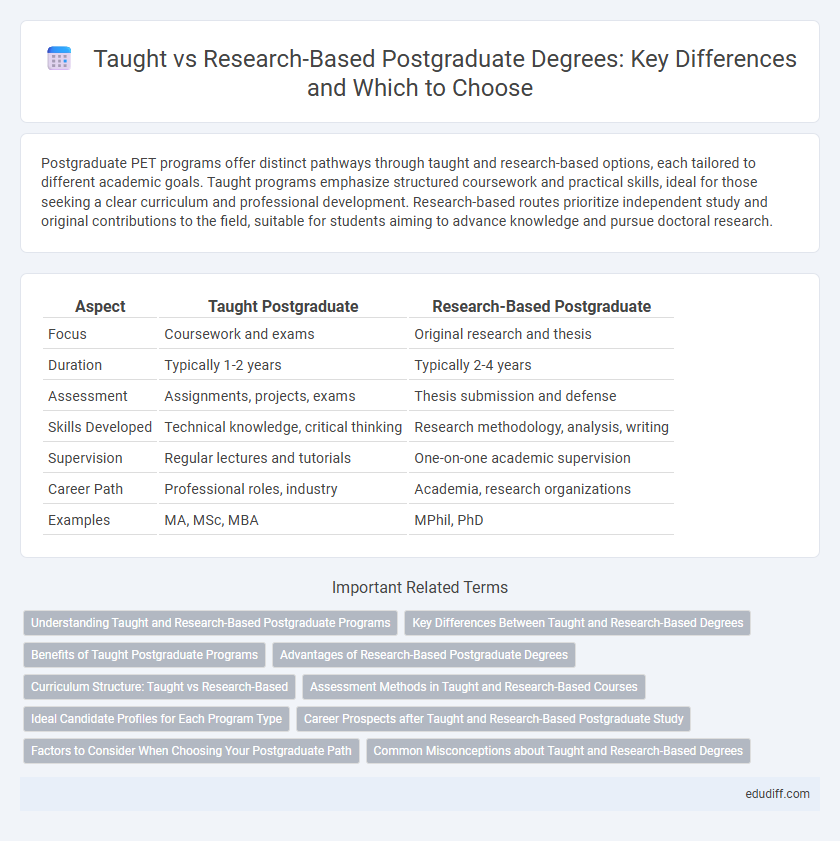Postgraduate PET programs offer distinct pathways through taught and research-based options, each tailored to different academic goals. Taught programs emphasize structured coursework and practical skills, ideal for those seeking a clear curriculum and professional development. Research-based routes prioritize independent study and original contributions to the field, suitable for students aiming to advance knowledge and pursue doctoral research.
Table of Comparison
| Aspect | Taught Postgraduate | Research-Based Postgraduate |
|---|---|---|
| Focus | Coursework and exams | Original research and thesis |
| Duration | Typically 1-2 years | Typically 2-4 years |
| Assessment | Assignments, projects, exams | Thesis submission and defense |
| Skills Developed | Technical knowledge, critical thinking | Research methodology, analysis, writing |
| Supervision | Regular lectures and tutorials | One-on-one academic supervision |
| Career Path | Professional roles, industry | Academia, research organizations |
| Examples | MA, MSc, MBA | MPhil, PhD |
Understanding Taught and Research-Based Postgraduate Programs
Taught postgraduate programs emphasize structured coursework, practical skills, and regular assessments, offering specialized knowledge in fields like business, education, or engineering. Research-based postgraduate programs focus on independent investigation, critical analysis, and original contributions to knowledge, typically culminating in a thesis or dissertation within disciplines such as science, humanities, or social sciences. Understanding these differences helps students align their career goals with suitable academic pathways, optimizing their postgraduate experience and outcomes.
Key Differences Between Taught and Research-Based Degrees
Taught postgraduate degrees emphasize structured coursework, regular assessments, and exams, providing a clear framework for mastering subject knowledge. Research-based degrees focus on independent study, original research, and thesis submission, allowing students to contribute new insights to their field. The key differences lie in assessment methods, learning style, and degree outcomes, with taught programs offering breadth and research programs prioritizing depth.
Benefits of Taught Postgraduate Programs
Taught postgraduate programs offer structured learning with set curricula, providing clear guidance and regular assessments that enhance knowledge retention and skill development. These programs facilitate direct interaction with experienced faculty and peers, fostering networking opportunities and collaborative learning. Graduates benefit from practical skills and industry-relevant expertise, improving employability and career advancement prospects.
Advantages of Research-Based Postgraduate Degrees
Research-based postgraduate degrees enable in-depth exploration of specialized topics, fostering critical thinking and advanced problem-solving skills essential for academic and industry innovation. These programs often provide opportunities to publish findings and collaborate with experts, enhancing professional credibility and career prospects. Graduates gain hands-on experience with research methodologies and original data analysis, positioning them as experts equipped to contribute to knowledge creation and policy development.
Curriculum Structure: Taught vs Research-Based
Taught postgraduate programs feature a structured curriculum with scheduled lectures, seminars, and assessments designed to provide comprehensive knowledge in specific subjects. Research-based postgraduate programs emphasize independent study, requiring students to develop original research projects under faculty supervision, with minimal formal coursework. The curriculum structure in taught programs facilitates systematic learning, while research-based programs prioritize critical thinking and innovation through practical investigation.
Assessment Methods in Taught and Research-Based Courses
Taught postgraduate courses primarily utilize continuous assessment methods such as coursework, presentations, and exams to evaluate students' understanding and application of subject material. Research-based courses emphasize thesis development, project reports, and oral defenses to assess analytical skills, originality, and contribution to the field. The choice of assessment method aligns with the learning outcomes, where taught programs focus on knowledge acquisition and research programs prioritize independent investigation and scholarly output.
Ideal Candidate Profiles for Each Program Type
Taught postgraduate programs suit candidates seeking structured learning with clear coursework and assessment, ideal for those aiming to gain practical skills and specialized knowledge quickly. Research-based programs attract self-motivated individuals with strong analytical skills, driven by curiosity and a desire to contribute original findings to their field. Candidates with a clear research focus, independent work habits, and resilience excel in research degrees, while those preferring guided learning environments thrive in taught courses.
Career Prospects after Taught and Research-Based Postgraduate Study
Taught postgraduate programs often enhance practical skills and industry connections, leading to direct employment opportunities in sectors like business, education, and healthcare. Research-based postgraduate studies develop expertise in specialized fields, fostering careers in academia, scientific research, and development roles within technology or pharmaceutical industries. Graduates from research-based courses frequently secure positions as research analysts, university lecturers, or R&D specialists, while taught degree holders typically transition into professional practice or management roles across varied industries.
Factors to Consider When Choosing Your Postgraduate Path
Choosing between taught and research-based postgraduate programs depends heavily on your career goals, preferred learning style, and desired level of academic independence. Taught courses offer structured learning with scheduled lectures and assessments, ideal for those seeking practical skills and professional qualifications. Research-based programs require strong analytical skills and self-motivation, focusing on original research, which suits candidates aiming for academic careers or specialized industry roles.
Common Misconceptions about Taught and Research-Based Degrees
Many students mistakenly believe that taught postgraduate degrees lack depth compared to research-based programs, though taught courses often incorporate extensive critical analysis and advanced subject knowledge. Another common misconception is that research-based degrees are only for those intending to pursue academic careers, while these programs also develop skills valued in industry and policy development. The assumption that taught degrees are easier overlooks the rigorous assessment methods, including exams, essays, and coursework, designed to ensure comprehensive mastery of the subject.
Taught vs Research-based Infographic

 edudiff.com
edudiff.com